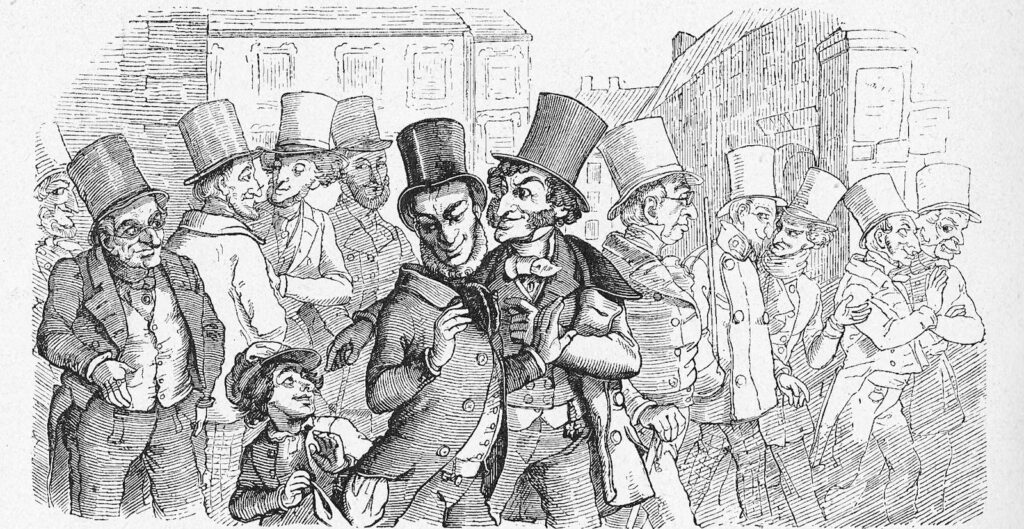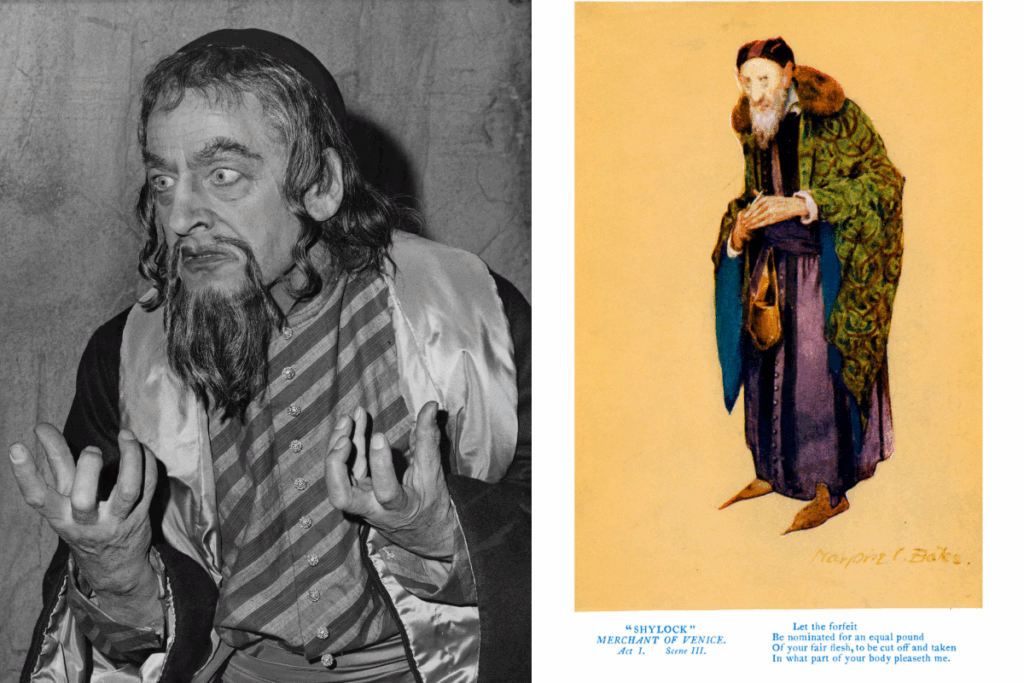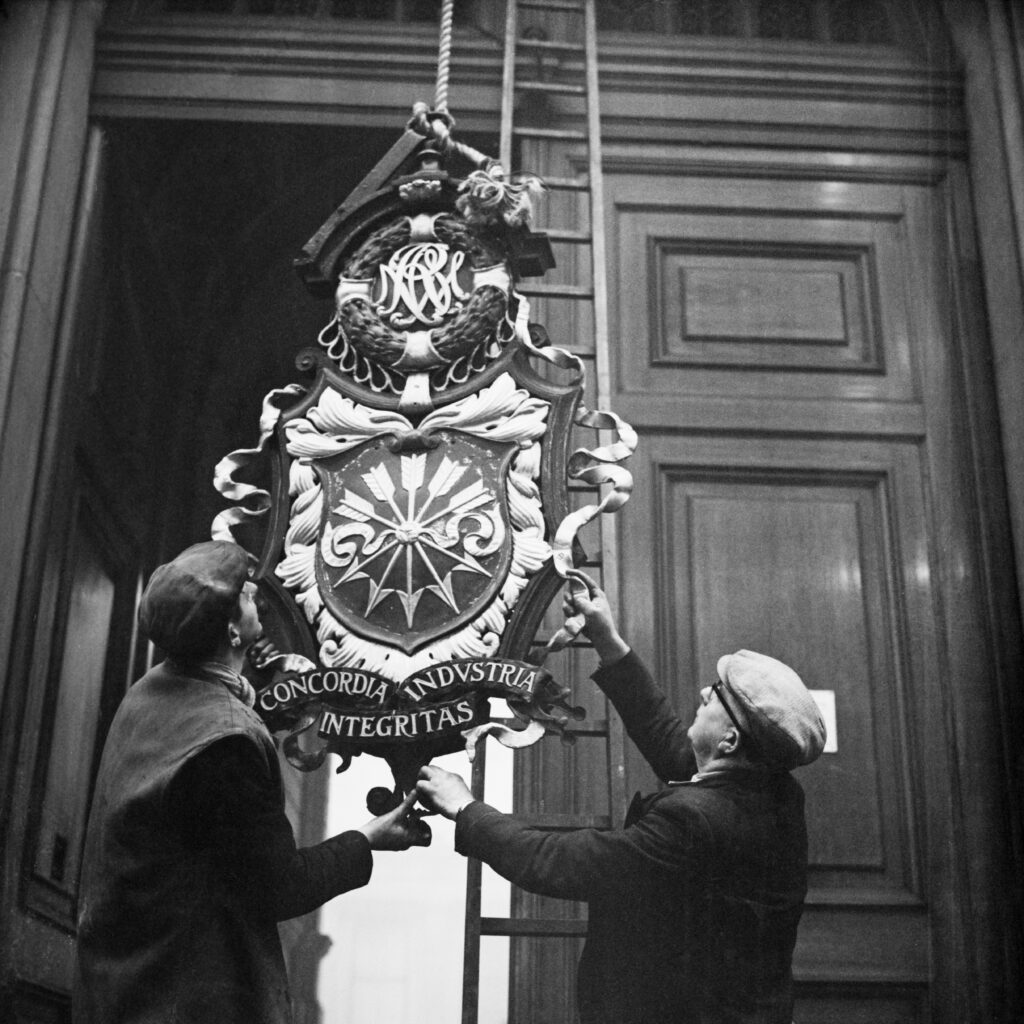Money
What are the antisemitic tropes about Jews and money?
Back to: Hey Alma’s Guide to AntisemitismIf you’ve heard just one antisemitic stereotype (lucky you!), it just might be the one about Jews and money. These age-old conspiracies are often about Jews being both greedy and frugal, but more than that, they imply insidious Jewish control over the finance industry. Here are some examples of how this cliché has manifested throughout history.
TL;DR: SHYLOCK / THE ROTHSCHILDS / GOLDMAN SACHS / LEHMAN BROTHERS / “THE PROTOCOLS OF THE ELDERS OF ZION” / GEORGE SOROS / JEWISH MONEY / POP CULTURE
Where did antisemitic tropes about Jews and money originate?
The idea that Jews and money go together like, um, dollars and cents goes back to at least the Middle Ages. And at that time, a popular gripe against Jews was that they were “usurers,” or people who lend money at unreasonably high interest rates.
The Bible prohibits taking or giving interest to a fellow Jew, but permits doing so for “strangers.” So it’s true that Jews were lending money and doing so to make profit. (Some have said that Christians didn’t lend on interest, and while it’s true that technically this was penalized, in practice it happened often, and Jews borrowed from Christians, too. The idea that Jews were the only moneylenders, or the only ones doing so for a profit, is not true.)
Christians complained about Jewish lending, but still took the money. And while some Jews may have lent at high interest rates, others collected after debtors went without paying for years — and then complained about what was owed.

It is sometimes said that Jews were only allowed to lend money; this is also untrue, though Jews were prohibited from certain work, and the extent to which this was the reason that some Jews became moneylenders is debated.
The other side of this — forgive us — coin, is the idea that Jews are cheap: obsessed with money, getting it back, and getting even more of it.
Is this what led to famous Jewish characters like Shylock, from Shakespeare’s “The Merchant of Venice?”
Yes, Shylock is the villain in “The Merchant of Venice.” A Jewish moneylender who wants to exact a pound of flesh — literally — from a man who owes him, he’s greedy, he’s vengeful, and his comeuppance comes in the form of conversion to Christianity. Written some time between 1596 and 1598, the name Shylock became synonymous with “greedy Jew.”

So was Shakespeare antisemitic?
Scholars and theater critics go back and forth on whether the play itself is antisemitic or whether it’s merely commenting on societal antisemitism at the time.
What is sometimes overlooked is that Shylock also offers a famous monologue in which he says that the way he treats others is a reflection of how society treats him. You may recognize the famous line, “Hath not a Jew eyes?”
Shylock’s monologue, which explicitly allows both the character and Jews as a whole their full humanity, was definitely a fairly progressive sentiment for the 16th century — even if voiced by an antisemitic caricature. Whether or not audiences pick up on that subtle twist, or simply allow the character of Shylock to bolster their biases about Jews, is hard to quantify.
Let’s move on from fictional Jews to real ones… What’s the deal with the Rothschild family?
The Rothschild family was a powerful banking family in Europe. Mayer Amschel Rothschild, born in 1744, his five sons and their families developed a Europe-wide banking empire, establishing businesses across the continent and making them one of the most visible and public Jewish families in the 1800s.
Their gardens and artworks and, yes, the giant loans they offered were renowned throughout Europe. Yiddish writer Sholem Aleichem even penned a story titled “If I Were a Rothschild” (you may know it as the inspiration for the song “If I Were a Rich Man” in “Fiddler on the Roof”).

The Rothschild family was, and still is, an influential family, but unfortunately they have also been victim to a lot of conspiracy theories that are simply not true.
What are some of the conspiracies about the Rothschild family?
Conspiracies about the Rothschild family include but are not limited to: The family knew the outcome of the Battle of Waterloo before news broke and made money off it; the Rothschild family controls the weather; the family orchestrated the Holocaust so that people would feel sorry for Jews and create Israel; the Rothschild family started California wildfires using lasers from space (for this, we can thank Congresswoman Marjorie Taylor Greene).
The Rothschild renown was brought over from Europe to America with immigrants, including Jewish immigrants — but their imagined influence in the United States was much greater than their actual impact here. But for many, the idea that the Rothschild family controls the world’s financial institutions still stuck.
What about Goldman Sachs, Lehman Brothers and other prominent Jews involved in American finances?
There were a number of American Jews who were instrumental in shaping the American financial system as we know it today. Goldman Sachs and Lehman Brothers are just a couple of names that show us what a prominent role American Jewish financiers played in establishing American financial institutions, particularly in the 19th and 20th centuries.
German Jew Paul Warburg was critical in the establishment of the U.S. Federal Reserve. But that doesn’t mean that Jewish families control the U.S. economy.
A big part of thinking otherwise is thanks to the “Protocols of the Elders of Zion,” an antisemitic screed that originated in Russia and described a secret plan by Jews to control the world by manipulating the economy and the media.
OK, what’s the deal with the “Protocols of the Elders of Zion?”
Basically, it was a text that purported to be (but was not actually) a secret Jewish world conspiracy — notes from Jewish meetings (that, again, were never really held) about controlling world politics and economics, as well as media and society. It was first published in Russia in the early 1900s.
Despite the publisher’s claims of the text’s veracity, there was no such secret plan and there were no “elders of Zion,” but that did not stop the “Protocols” from spreading and enduring, including in the United States (further proof that Jews have often been seen as “foreign” no matter where they are, which you can read more about here.
Case in point: Henry Ford — the founder of Ford Motor Company and famed antisemite — published multiple articles based on the “Protocols” in a series called “The International Jew: The World’s Foremost Problem.” These articles were then translated into at least 16 languages. For his trouble, Ford won the admiration of Adolf Hitler. (Yes, this may be why your great-uncle refuses to drive a Ford Escape.)
If we’re talking about Jews and money and conspiracies, we’ve gotta talk about George Soros, right?
George Soros, the Hungarian-born billionaire philanthropist, is the subject of conspiracy theories around the world, notably from rightwing politicians and their supporters.
Soros was born to a Jewish family in Hungary. They survived World War II by hiding out with, and as, Christians (a fact some have used to suggest that Soros helped the Nazis, which he did not. Though he did, at one point, accompany the man who was hiding him to take stock of what was in a Jewish home).

As a young man, Soros studied at the London School of Economics, and went on to work for hedge funds, eventually establishing his own. He became perhaps the most famous currency speculator in the world, notably for his involvement in the “Breaking of the Bank” of England, when the pound collapsed after Soros (among others) took an aggressive “short” position on it (“shorting” currency, which is what Soros did with the pound, means selling something you don’t actually own with the intention of buying it later for a lower price, because selling short puts downward pressure on the value of whatever it is you’re selling). England ended up being forced out of the European Exchange Mechanism.
He also founded Open Society Foundations, a philanthropy dedicated to the idea that all people should be empowered to participate in civic society. In the 1980s, they were primarily focused in Central and Eastern Europe, doing things like funding photocopiers to ensure socialist governments weren’t the only ones who could control dissemination of information and scholarships so students could travel and be exposed to other ideas.
How has Soros been involved with U.S. politics?
In the 2000s, Soros, separately from his philanthropic work, became heavily involved in U.S. political spending, believing George W. Bush was a threat to his favored idea of an open society. He’s also been a longtime proponent of the idea that the war on drugs is the wrong approach and addiction should be seen as a medical issue, and has donated to progressive prosecutors’ election campaigns.
So what are the antisemitic conspiracies surrounding Soros?
There is plenty of criticism about George Soros that is grounded in reality: some ask why individual financial actors should be able to short so much of a country’s currency as to have geopolitical impact. Others think billionaires’ money shouldn’t be in politics. But there are also conspiracies, which, to be very clear, are not true.
For example, accusations that Soros is “flooding the country with immigrants” or that he’s “remaking America” play on the antisemitic idea of the all-powerful Jew trying to undermine the nation, even if the word “Jew” is never said (though often people do use a substitute: “globalist”).
And what about accusations of certain things being “Soros-backed” or “Soros-funded?”
First of all — some things are Soros-funded! It’s absolutely true that Soros is a leading backer of progressive DA candidates, and pointing that out or criticizing his liberal politics more generally isn’t antisemitic. People have every right to note the influence of billionaires’ money in politics, or to note that Soros is funding progressive DA candidates, and to say that they disagree with him for doing so.
But it’s also true that there are those for whom Soros’s Jewishness is central to the critique, either because it’s lambasted with coded terms like “globalist” or because the criticism relies on antisemitic tropes. For example, claiming Black Lives Matter or pro-Palestinian protesters are orchestrated by George Soros not only overassigns agency to a single Jewish person, but also takes it from those who are out on the streets protesting, dismissing the reason they’re there in the first place. In other words, it’s dehumanizing to Jews, but to other people, too.
What about the term “Jewish money” in general?
Some readers might have heard decisions at institutions or in politics chalked up to “Jewish donors” or even “Jewish money.”
It is true that there are Jewish donors who do, in some cases, push to have influence on policy. For example, in May of 2024, the Washington Post reported that “a group of billionaires and business titans working to shape U.S. public opinion of the war in Gaza privately pressed New York City’s mayor last month to send police to disperse pro-Palestinian protests at Columbia University.” Some of those billionaires and business titans were Jewish.
But the idea that Jews only give to Jewish groups or try to push on, say, Israel policy is also misguided: In 2022, 12 billionaires of Jewish background were on the list of America’s “most generous givers.” Almost none of them focused on explicitly Jewish causes.
We’ve talked a lot about Jewish billionaires. What about Jews of less means?
Roughly 20% of American Jews are reported to live below the poverty line. And while many American Jews’ families did follow the story of late 19th or early 20th century immigration followed by assimilation and acculturation and accumulation of wealth, that certainly isn’t true of all American Jews. The fifth that lives below the poverty line, for example, includes some Russian Jews who came to the United States later.
Does pop culture perpetuate the notion that all Jews are wealthy?
Yes and no. There are certainly some movies and shows about rich Jews. “Princesses: Long Island,” a reality show from a decade ago, was cancelled after its one season, which was marked with Jews up in arms about what a stereotypical depiction of spoiled Jewish girls it offered.

“Never Have I Ever,” a fictional series about the teen trials and tribulations of a young Indian American woman, featured a Jewish character named Ben who was the son of a rich and powerful entertainment lawyer. Netflix’s “You Are So Not Invited to My Bat Mitzvah” featured lavish parties, though they were admittedly inspired by real events. And the Cohen family on “The O.C.” was so rich that there is a Reddit thread debating just how rich they were.
One recent study found that, while a fifth of Jews are below the poverty line, Jews who earn less than $50,000 a year are 10 times less likely to show up in movies and TV shows (though the study was an imprecise one, marking some non-Jewish characters as Jewish). There is certainly no shortage of “Jewish American Princesses” in American movies or shows, and the trope pops up in music, too. “We been gettin’ that Jewish money, everything is Kosher,” 21 Savage rapped in 2018 (he later apologized).
Still, some of the most famous pieces of pop culture in American Jewish history are about either working class Jews — like “The Nanny” — or about the struggling immigrant Jewish experience (consider Adrien Brody’s Oscar-winning portrayal in “The Brutalist”). Some directors, like Joan Micklin Silver, explored socioeconomic divides within Jewish communities in movies like “Hester Street” and “Crossing Delancey.” And for a look at how the narrative about Jews and wealth impacts the self-narrative of Jews who aren’t wealthy, there are movies like Tamara Jenkins’ (very good, in our opinion) “Slums of Beverly Hills.”
